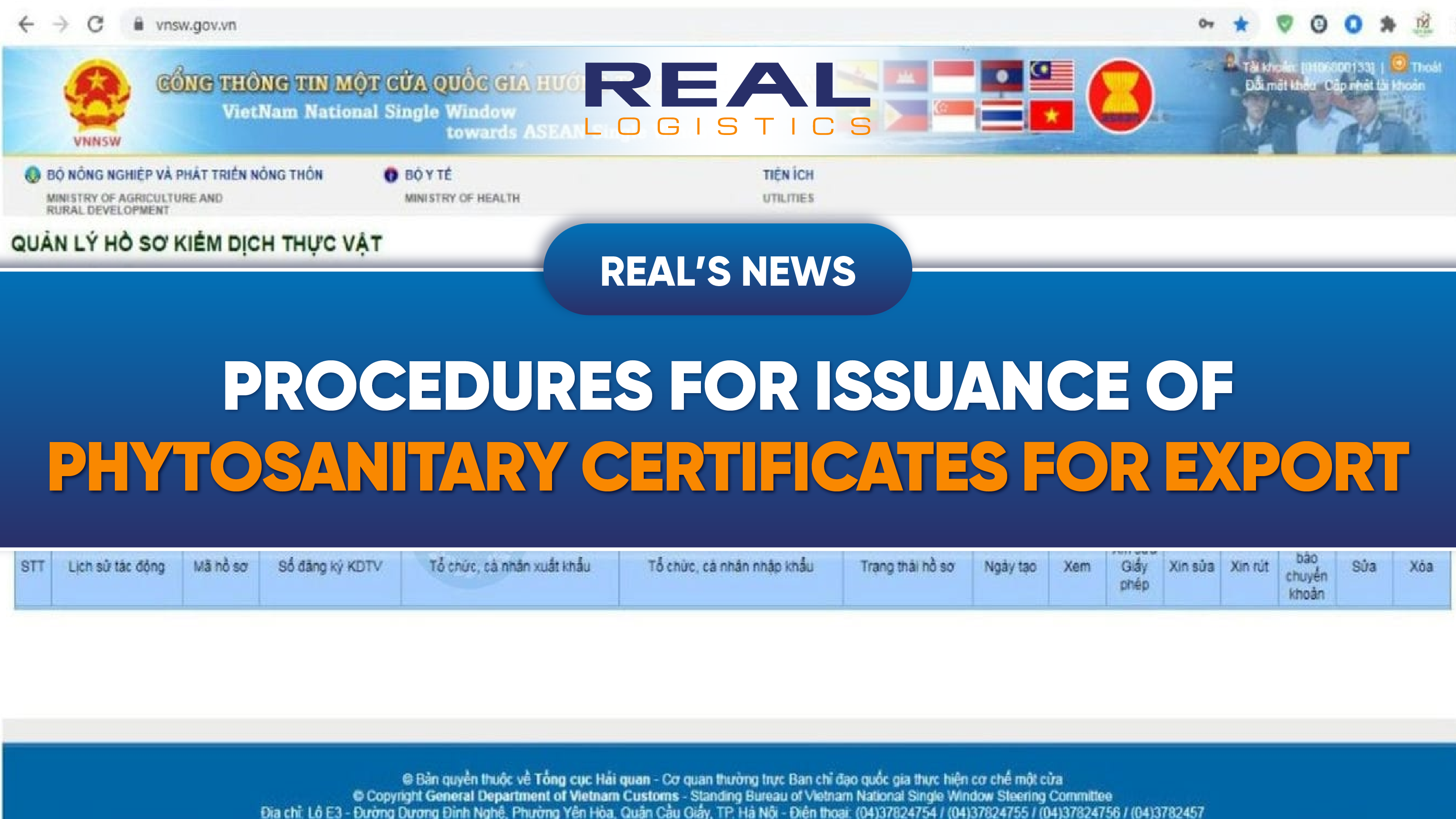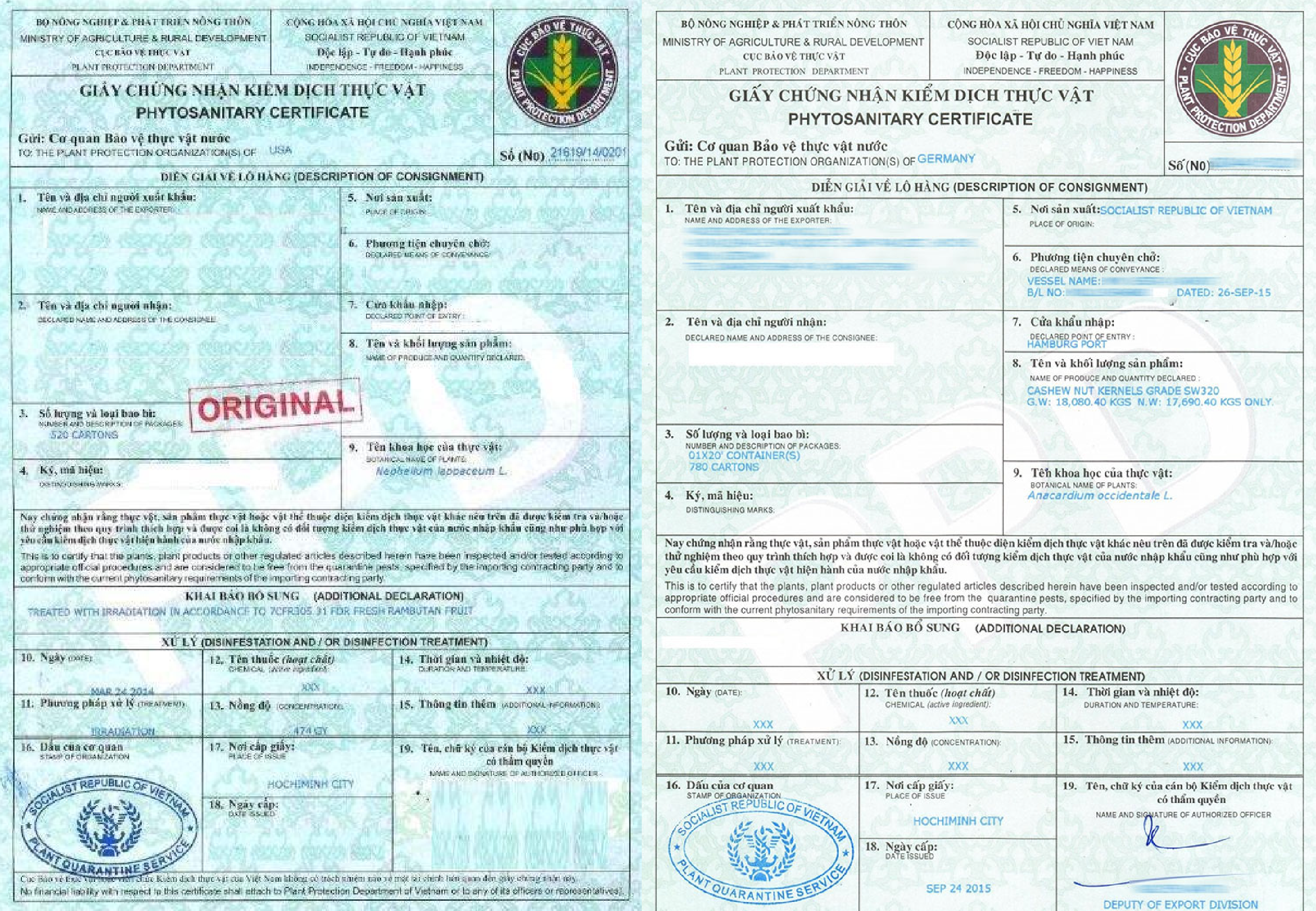Procedures For Issuance Of Phytosanitary Certificates For Export

1. What is Export Plant Quarantine?
Export Plant Quarantine (Phytosanitary) is a crucial process to ensure that exported goods do not carry dangerous pests, viruses, insects, or pathogens that could harm plant health. This is a mandatory requirement for many types of goods to prevent the spread of plant diseases across regions and to ensure compliance for customs clearance and legal exportation.
If a shipment requires quarantine but lacks the necessary certification, customs clearance procedures may be delayed, affecting delivery timelines.
1.1. What is a Phytosanitary Certificate (Phyto)?
A Phytosanitary Certificate (Phyto) is an official document issued to certify that goods have met all plant quarantine requirements for export or import.
1.2. Types of Phytosanitary Certificates
Phyto certificates are categorized into two types:
- Export Phyto Certificate: Issued for goods being exported to verify compliance with quarantine standards.
- Import Phyto Certificate: Issued for imported goods to ensure they do not carry harmful pathogens.
Both certificates contain key details such as:
- Sender and recipient information
- Scientific name of the plant product
- Quantity and packaging details
- Means of transportation and entry port
- Inspection date and certification authority details

2. Export/Import Plant Quarantine Process
To ensure compliance with all plant quarantine regulations, businesses must follow these steps:
Step 1: Prepare Documentation
The required plant quarantine documents include:
No. | Document Name | Preparation Instructions | Type | Hard Copies | Notes |
1 | Invoice | Signed & stamped (overlapping or hanging) | Scan + hard copy | 01 copy | |
2 | Packing List | Scan + hard copy | 01 copy | ||
3 | Bill of Lading | Hard copy | 01 copy | ||
4 | Quarantine Registration Form | Hard copy | 01 copy | ||
5 | Introduction Letter | Hard copy | 02 copies | ||
6 | Quarantine Sample (Dry Goods) | 1-2 kg sample | |||
7 | Quarantine Sample (Fresh Goods) | Inspection may be conducted at the warehouse or checkpoint |
Step 2: Declare Quarantine Information
Businesses must declare quarantine details via the National Single Window System or PQS (depending on regulations).
Step 3: Apply for Import Permit (If Required)
If the goods fall under the category requiring an Import Permit (IP), businesses must apply for and obtain approval before proceeding.
Step 4: Submit Quarantine Registration Form
Once the quarantine declaration is completed, businesses must submit the registration form to proceed with the physical inspection.
Step 5: Physical Inspection of Goods
The quarantine authority will conduct sampling and physical inspection at either the exporter’s warehouse or the checkpoint to assess the condition of the goods and ensure they are free from harmful pests.
Step 6: Complete Quarantine Documentation (For Exported Goods)
After shipment departure, businesses must provide a draft bill of lading to finalize the quarantine process.
Step 7: Issuance of Phytosanitary Certificate
The plant quarantine department will issue a Phytosanitary Certificate, completing the export procedure.
Learn more:
2025 Import-Export Tariff Schedule
3. Benefits of Plant Quarantine
Plant quarantine is not only a legal requirement but also provides several benefits:
- Ensures product quality: Quarantined goods have a lower risk of contamination, enhancing quality in export markets.
- Facilitates international trade: Many countries require a phytosanitary certificate to accept imported goods.
- Prevents legal risks: Compliance with regulations helps avoid shipment delays or penalties due to quarantine violations.
4. The Relationship Between Plant Quarantine and Food Safety
Plant quarantine plays a critical role in ensuring food safety:
- Traceability of food sources: Quarantine measures help track product quality from production to consumption.
- Safety of plant-based food products: Prevents harmful pathogens from affecting agricultural products.
- Quality control of animal feed: Ensures clean and safe feed sources for livestock, contributing to high-quality end products.

5. Plant Quarantine Services at Real Logistics
If your business faces challenges in completing plant quarantine procedures, Real Logistics is a reliable partner to help streamline the process. Our team of experts is experienced, dedicated, and transparent, always prioritizing client interests.
Why Choose Real Logistics?
✅ Free consultation on plant quarantine procedures
✅ Fast and accurate declaration via electronic systems
✅ Ensured on-time customs clearance
✅ Competitive pricing with professional service
📞 Contact us now for assistance!
—————————————
Real Logistics Co.,Ltd
👉 Facebook: Real Logistics Co.,Ltd
☎️ Hotline: 028.3636.3888 | 0936.386.352
📩 Email: info@reallogistics.vn | han@reallogistics.vn
🏡 Address: 39 - 41 B4, An Loi Dong, Thu Duc, HCM City
51 Quan Nhan, Nhan Chinh, Thanh Xuan, Ha Noi City

